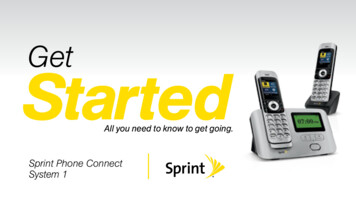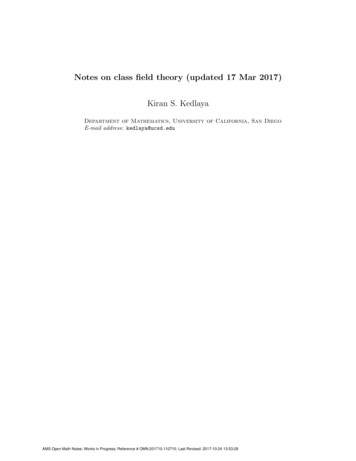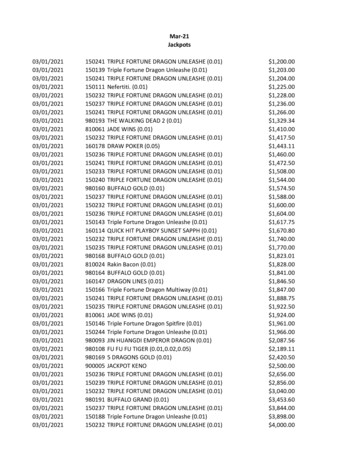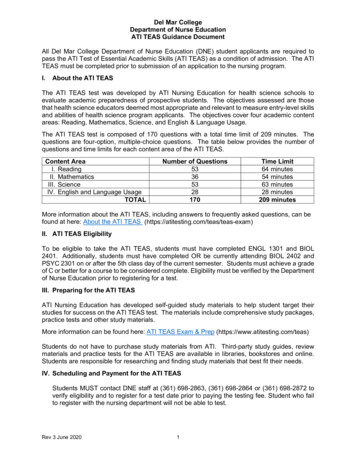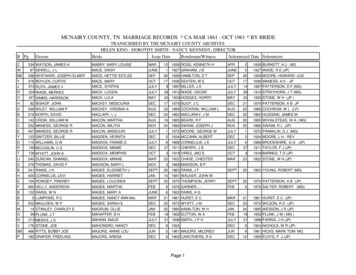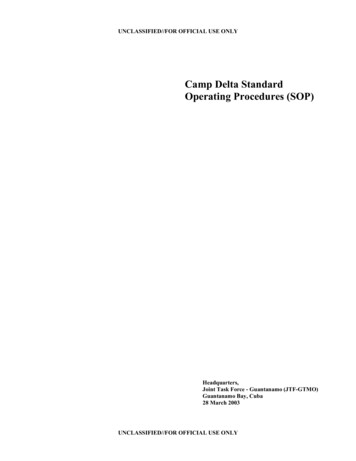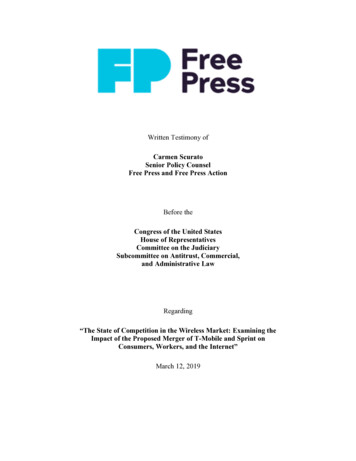
Transcription
Written Testimony ofCarmen ScuratoSenior Policy CounselFree Press and Free Press ActionBefore theCongress of the United StatesHouse of RepresentativesCommittee on the JudiciarySubcommittee on Antitrust, Commercial,and Administrative LawRegarding“The State of Competition in the Wireless Market: Examining theImpact of the Proposed Merger of T-Mobile and Sprint onConsumers, Workers, and the Internet”March 12, 2019
OverviewFree Press, on behalf of its more than 1.4 million members across all fifty states, the Districtof Columbia, and Puerto Rico, strongly opposes the proposed merger between T-Mobile and Sprintthat is the subject of this important hearing.We’ve conducted extensive research on the proposed merger. Our filings1 in the FederalCommunications Commission (“FCC”) proceeding to examine the transaction, which we havesummarized and updated in the attached Exhibit A to this testimony, demonstrate conclusively thedisproportionate harms this deal would cause to low-income communities and people of color,who are more likely to be on the wrong side of the digital divide, and who more often rely onmobile phones as their only means of connecting to the internet.Other attorneys and analysts at Free Press signed the FCC’s protective orders, and thuswere able to assess the merger applicants’ confidential filings, as well as proprietary industry datathat more precisely indicates wireless carriers’ market shares and customers’ switching patternsbetween them. This testimony cannot and does not make use of material subject to the protectiveorders, and is thus based entirely on publicly available data and arguments. That does not changethe conclusion that this deal’s speculative benefits do not offset its obvious harms.Sprint and T-Mobile (and their respective pre-paid brands: Sprint’s Boost and Virginaffiliates, and Metro by T-Mobile) are the dominant providers of mobile telecommunicationsservice for low-income people. For instance, more than 30 percent of Metro and Boost subscribersreport yearly incomes of 25,000 or less.1See Petition to Deny of Free Press, Redacted for Public Inspection, WT Docket No. 18-197 (filed Aug. 27, 2018)(“Petition to Deny”), -08/free-press -petition-tmobile-sprint.pdf;Free Press, Reply to Opposition, Redacted for Public Inspection, WT Docket No. 18-197 (filed Oct. 31, 2018)(“Reply”), -11/redacted tmobile sprint reply comments freepress.pdf1
Due to structural and systemic racism, people of color are disproportionately representedin these demographics. T-Mobile and Sprint customers are far more likely to be people of colorthan are AT&T’s and Verizon’s customers. For example, 56 percent of T-Mobile’s subscribers in2018 identified as people of color, as did 45 percent of Sprint’s subscribers.The reason that members of these communities choose Sprint and T-Mobile is very clear:their plans cost less. As Free Press and other merger opponents’ research confirms, these twocarriers compete with one another vigorously. They are each other’s closest competitors. Theyserve price-conscious customers that AT&T and Verizon are both content to ignore and quite ableto ignore profitably, as those larger carriers focus on quality-conscious and “premium” customerswilling and able to pay more for wireless service.Despite any suggestion that only T-Mobile has been able to compete with AT&T andVerizon, our filings trace all of the four nationwide carriers’ performance to show that both TMobile and Sprint have been “mavericks,” and both have been vital for the better competitiveresults seen over the past several years. Both T-Mobile and Sprint take customers from each other,and from each other’s pre-paid brands. Yet T-Mobile and Sprint also both win customers awayfrom the “big two” carriers as well. This pro-competitive behavior increased after, and was fueledby, the government’s rejection of the previously proposed horizontal mergers like this very sameT-Mobile/Sprint tie-up in 2014, and AT&T’s failed 2011 T-Mobile takeover attempt.Exhibit A discusses the parties’ inflated efficiency claims, as well as greatly exaggeratedrumors of Sprint’s death put forward to justify this transaction. Both topics are covered even morethoroughly in our full FCC filings. Our focal point today is the harm to price-conscious customersin low-income communities, communities of color, and pre-paid market segments.2
First: No matter how antitrust enforcers define the relevant product markets for purposesof their analysis here, our FCC filings illustrate the inescapable fact that this deal would furtherconcentrate already highly-concentrated markets. In doing so, it would eliminate choices forpeople who want or need to pay less for essential communications services. Our filings documenthow T-Mobile and Sprint’s pre-paid and post-paid offerings compete, with these two carriersfrequently countering each other’s moves in ways that benefit price-conscious customers and thatexert some discipline on Verizon and AT&T as well.Simply put, T-Mobile and Sprint both offer lower-priced options than their larger rivals do.That is because of their rivalry with each other. Their outlandish suggestion that having fewercompetitors somehow strengthens competition is wrong in any case, but especially for priceconscious customers. Merger proponents’ incomprehensible math tries to obscure the fact that thisis a 4-to-3 merger, and 3-to-2 in pre-paid, with AT&T’s Cricket brand the only other remainingfacilities-based option there. This merger would reduce choices for lower-priced plans that don’ttypically require customers to pass credit checks or finance devices through the carrier.Second: This merger would increase prices. In their filings, Sprint and T-Mobile don’teven hide the likelihood that prices would go up for their post-paid and pre-paid customers alike.That bears repeating and special emphasis: their own economic models say prices would go up.Our FCC filings catalogued the conflations and assumptions originally used by T-Mobileand Sprint to obscure that reality. They prop up their implausible claim that prices would actuallygo down eventually, or depending on how you look at it, based on the false suggestion thatincreased “supply” of spectrum and bandwidth in the New T-Mobile’s hands would automaticallynecessitate a decrease in prices – even in the absence of competitive pressure.3
Other deal opponents filed far more extensive refutations of T-Mobile’s and Sprint’ssuggestions. They questioned not only the validity of the merging parties’ models, but also theirassertion that heavy data users would be better off with the supposed benefit of minimallyimproved speeds and coverage despite the price increases destined to happen.2The merging parties’ claims in each case boiled down to little more than an assertion thatany price increases would be worth it – perhaps as customers were given the option to purchasemore data and faster speeds; or, as is more likely to be the case, as customers were given no optionbut to purchase such plans at a greater out-of-pocket expense, even when they could not afford todo so or would not choose to do so.T-Mobile’s loophole-riddled pricing pledge does nothing to allay this concern or changethis impression. In the original announcement in a short letter filed with the FCC, T-Mobilepromised that its own and Sprint’s legacy plans would continue “for three years . . . or until betterplans that offer a lower price or more data are made available.”3 This mockery makes the entirepledge meaningless: post-merger prices will stay the same, unless of course New T-Mobilechanges its mind. Just as T-Mobile did in its initial attempts to explain away such harms, it is thecarrier that gets to decide that a more expensive plan is “better” if and when it offers more datathan many customers might want, need, or be able to afford.2See DISH Network Corporation, Comments in Response to Public Notice Regarding Cornerstone Report, c%2018.pdf(“Instead of denying the prospect of price increases, the Applicants seem to stake their entire case on the propositionthat consumers will accept New T-Mobile’s higher prices because they are supposedly willing to pay adisproportionately large amount of money for even an ounce of improvement in the quality of their current 4G LTEservice.”).3Letter from Nancy Victory, Counsel to T-Mobile, to Marlene H. Dortch, Secretary, Federal CommunicationsCommission, WT Docket No. 18-197, at 2 (filed Feb. 4, 2019) (emphasis added) (“T-Mobile 19.pdf.4
T-Mobile’s attempts to “clarify” this pledge leave in place the same ambiguities, allowingthe merged firm to raise prices even within the first three years, to say nothing of the years thatfollow. Its purported clarifications only muddy the waters. There are internal contradictions withinthe latest T-Mobile filing on this point, to say nothing of the way the document conflicts with theoriginal pledge and the parties’ FCC applications and economic models.Third: This merger would mean massive consolidation in the wholesale wireless market.T-Mobile and Sprint are wholesale suppliers. Reducing wholesale supply would raise costs forresellers who rely on that wholesale capacity, with the resellers passing along those increased costsin the form of higher prices for their own retail customers.Wholesale is used by carriers without their own networks – including most wirelessLifeline carriers – to offer services at resale. Free Press has been a strong supporter of Lifeline,defending it against unfortunate and unfounded attacks by the current FCC, because Lifeline helpsthe most vulnerable in society stay connected with a benefit of just 9.25 a month to defray thehigh cost of voice or broadband service. What that subsidy gets participants has evolved, thanksin large part to competition. When the FCC first approved wireless Lifeline offerings, TracFoneoffered recipients a measly 68 monthly voice minutes. When Virgin entered the Lifeline marketwith a better plan, TracFone responded by nearly quadrupling its own offering.Lifeline competition and Lifeline in general are dependent on a well-functioning wholesalemarket. Consolidation of the type contemplated here would further widen the quality gap betweenLifeline offerings and non-subsidized plans. And since most facilities-based carriers including TMobile have largely abandoned the Lifeline program, this lessening of wholesale competition andLifeline competition would harm recipients of that vital affordability program.5
Merger Background and Summary of HarmsOn April 29, 2018, T-Mobile and Sprint formally announced their intent to merge, with TMobile the surviving entity. On June 18, 2018, they filed their public interest statement with theFCC, purporting to outline the benefits of the proposed merger.4 As we demonstrated in ourpetition calling on the FCC to deny the transaction, T-Mobile and Sprint failed to show at theoutset that this deal would not lessen competition. They likewise failed to show any efficiencies,supposedly offsetting the harm of reduced competition, that were merger-specific, cognizable, orof greater weight than harm from further concentration of highly concentrated markets.For these reasons, even as we explained that the deal could not satisfy the parties’ burdenof proof before the FCC to demonstrate affirmative public interest benefits, we showed too thatthis merger would violate the antitrust laws of the United States based on Department of Justice(“DOJ”) guidelines and past precedent. The merging parties have conceded in their FCC filingsthat the concentration of the market would generate upward pricing pressure.In the end, T-Mobile and Sprint’s claimed efficiencies and net benefits for this proposedhorizontal merger are negligible at best, and upon close scrutiny appear to be non-existent. Evenif those claimed benefits were legitimate, they are not merger-specific, and not nearly enough tooffset the harms from the loss of a competitor in an already highly concentrated market or the priceincreases destined to follow from that combination. And the merging parties’ funny math –claiming elimination of a competitor would somehow increase the number of viable competitors– is the kind of doublespeak that members of this subcommittee must see right through.4See Applications of T-Mobile US, Inc. and Sprint Corporation For Consent To Transfer Control of Licenses andAuthorizations, WT Docket No. 18-197, Description of Transaction, Public Interest Statement, and RelatedDemonstrations (“Application”).6
The bottom line is that nothing about this deal begins to offset the harms from the mergerof the two primary carriers that serve the price-sensitive cellular market segment. This merger’sirreversible harms to competition would be most acutely felt by subscribers who rely on theavailability of lower-priced wireless options, and in particular by those who have low incomes –with people of color disproportionately represented in that low-income demographic anddisproportionately stuck on the wrong side of the digital divide.This merger would especially harm those types of customers, often living in many of thenation’s largest cities, as well as all other wireless subscribers who would likewise suffer from aloss of choices and resulting increase on the likelihood of coordinated effects in a market nearly100 percent controlled by three roughly equal-sized firms. At a time when the modicum of wirelesscompetition we see in today’s market has finally yielded some benefits for the average customer,approval of this merger should be unthinkable. As our FCC filings summarized: The relevant produ
12.03.2019 · any price increases would be worth it – perhaps as customers were given the option to purchase more data and faster speeds; or, as is more likely to be the case, as customers were given no option but to purchase such plans at a greater out-of-pocket expense, even when they could not afford to do so or would not choose to do so.

